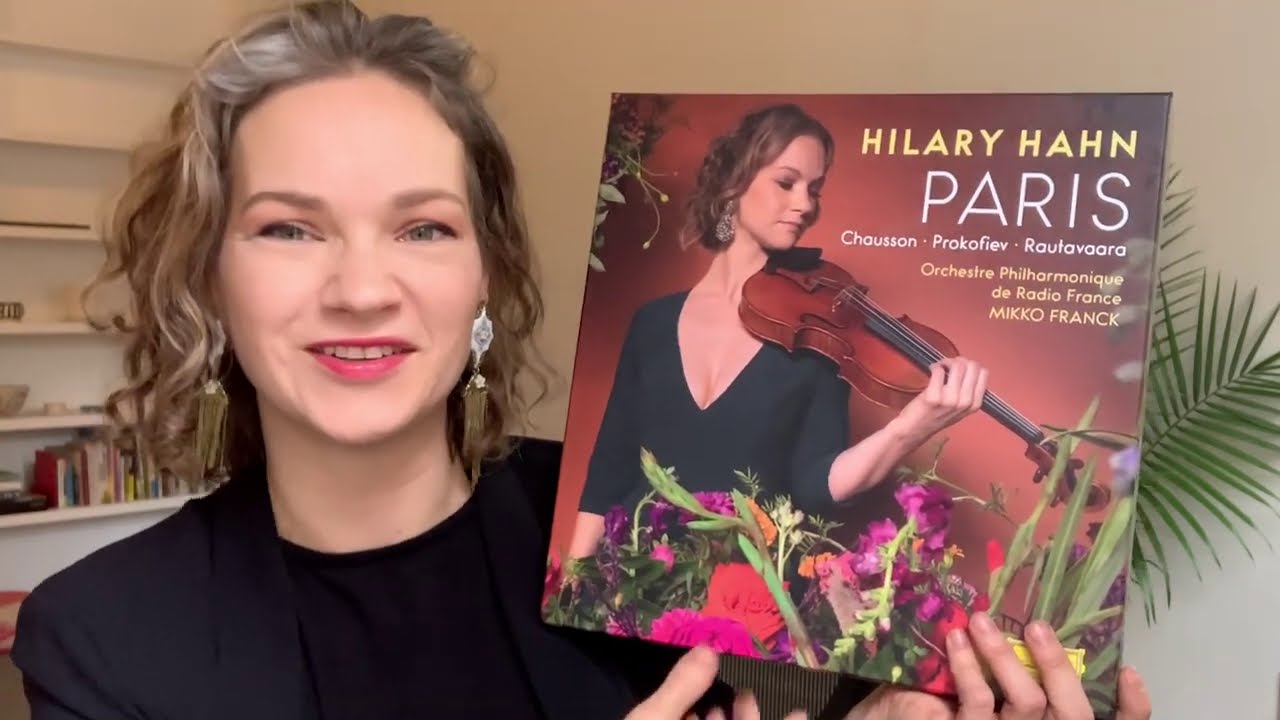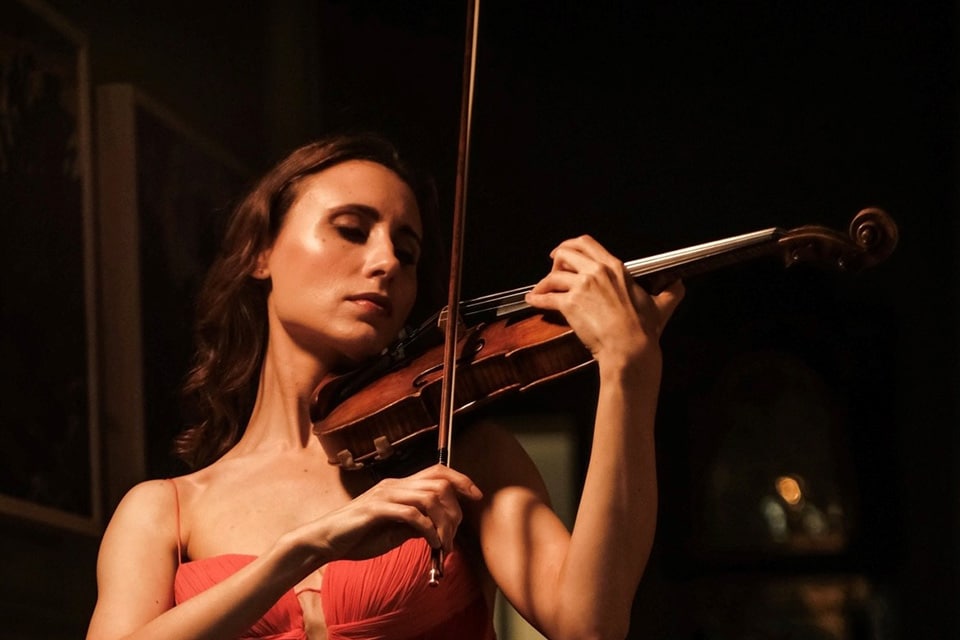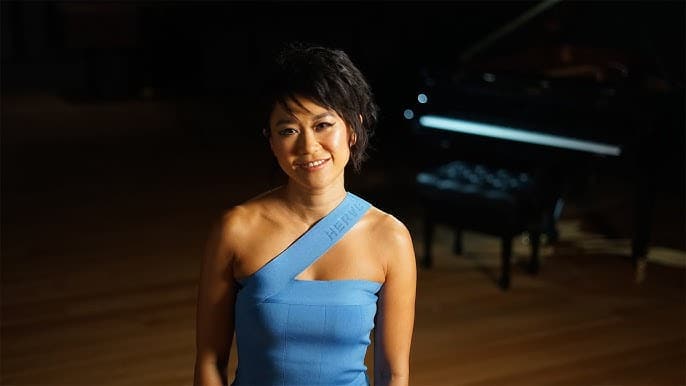Hilary Hahn’s Paris? I’ve eaten fresher croissants in Helsinki
mainFrom the Lebrecht Album of the Week:

When you hear the term ‘multiple issues’ in 2021 it usually signifies that Covid is not the only cause of death. This album has multiple issues. On the positive side, it marks the return of the US violinist Hilary Hahn after a year’s sabbatical that was doubled in length by pandemic lockdown. Hahn, 41, is one of few concert violinists to enjoy broad media recognition and she is much needed on our empty concert stages. …
Read on here.
And here.
In Czech.
In The Critic.
Here’s her promo video:





“And then he said”Broad Media recognition””
cue in, Good fellas Laughing Meme
Why “Album of the Week” if you liked it so little Norman?
Rautavaraa is not the only composer who struggles to escape the shadow of Sibelius. All Finnish composers to a certain extent do.
This is clearer when concert programs contain a work by the Finnish composer du jour – I am talking about you, Kaija Saariaho – and another by Sibelius. It does not take much to realize who is the great composer and who is the also run – and I am being generous here.
“Hahn’s playing in the Chausson Poème lacks colour, passion and seduction. In terms of traditional interpretation, it is not neurotypical.” What an utterly reprehensible comment.
Um, maybe Norman was trying to point out that Hilary shouldn’t try to be so “neurotypical” given that the Prokovief was of another cast. Hilary’s whole encore album, to me also is the whole characterization of “neurotypical,” with it’s non detached detachment, something “clinical” that ads up to a “competition,” which is a new one as they go. Or back to when the monarchs wanted to be pleased, given the one person “jury”. Or why anyone would call it a competition, or have any kind of such. Disengaging from the past that has remained, regardless, in order to get into a fashion that won’t, and hasn’t, when really disengaging from it would be engaging with it. It’s not time related. And then we have the Paris quote you missed taking a “shot” at; “Nor is it Parisian in any way that I, who am half-Parisian, can recognize.” There’s a lot that went on in Paris, read Hemingways posthumous https://en.wikipedia.org/wiki/A_Moveable_Feast which is only one fragment, a skim of what was going on there. Something that happens whenever such creativity finds a place to bustle. You don’t animate that taking what’s left from there, putting it on “display,” and then…
I don’t even know what to say about it, because it makes me laugh already.
Like people trying to dig up Atlantis, find the holy grail, pieces of the cross, the nails that pierced the “Messiah,” and then forget to look up at the stars, they are so busy…. Or see that teenage boy come riding by on a bike that could have more of a life than who they make such an object out of, when that actually is “the resurrection.”
Fortunately they leave him alone so he will…
Oh, and “Happy Easter….”
Sincerely curious: what does “half-Parisian” mean?
A half-hearted attempt to validate an opinion.
1) Not enough packaging. Barely enough to choke a seal. More!
2) On the other hand, would you buy an album called “Helsinki”?
3) The rust color scheme is all wrong. Brown and purple and green. The palette is literally nauseating,.
Prokofiev concerto, started during or shortly after visit to Paris. Premiere in Paris.
Rautavaara, written for Ms Hahn and premiered in Paris.
Chausson, born in Paris, studied composition in Paris, buried in Paris, and has a park with his name in Paris.
Just think she could have brought Michael Jackson to Paris, and added to it. There MUST BE some IMG colleague or someone from Curtis. Or maybe Mr. Joshua Bell, now he’s happily married, will settle down and actually compose something related to “Paris.” Create some furor with the English that have become so fond of him, to get back to the color of roses. Or, further more there’s maybe some wildlife in Paris: https://theculturetrip.com/europe/france/paris/articles/where-the-wild-things-are-in-paris/
Perhaps a little bit unfair …. The Rautavaara and Prokofiev were premiered in Paris, and Chausson was Parisian. It’s not a strong connection, but more than you suggest. I have listened to the album through a streaming service and think all three performances are actually quite good and I appreciate the clarity, focus, and intensity of both Hahn and the orchestra.
‘Fresher croissants in Helsinki’? Depends where you buy them in Paris. As any fool no (pace, Willans and Searle), you can get rubbish anywhere. Paris is no exception.
I gave up on Hilary Hahn shortly after she “went pro,” essentially doing her manager’s bidding.
She’s much better at Violin than you.
she is frighteningly good. i mean there is nothing in the rep that is remotely technically challenging for her. and she is simply nice, no ego.
Helsinki does actually have some excellent croissants.
What earthly use is there for music criticism? A good journalist is trained to scrupulously present the facts, clean and free of personal opinion. Truly fine musicians are too humbled by the magnitude of the task of bringing the joy of music to listeners’ grateful ears to lower themselves to the level of willfully negative criticism. What use is there for criticism? It shows neither good journalism, nor good musicianship.
Thank you, dear Hilary Hahn for the gift of a new recording, for the hours, days, and years of loving care you have put into honing your awe inspiring talent. Thank God for those like you who dedicate their lives to bringing joy, beauty, and sharing of their art to this world.
And thank you for this truthful and on-the-spot comment!
“A good journalist is trained to scrupulously present the facts, clean and free of personal opinion.”
A critic, however, is trained (or should be) to represent the art through the lens of his or her own perceptions and — yes — judgments. Objectivity is useless: a critic could say “these are the pieces on the CD. These are the performers. Ms. Hahn (or whoever) performs them with accuracy (or doesn’t).” And that’s about all they could say… objectively. If anyone asked “Yes, but is it any good?” the critic, so-called, would have to say “Sorry, that would be offering an opinion.”
A critic’s job* is not to be “objective,” but rather to be clear about his or her biases and preferences — and the reasons for them, whenever possible — so that a reader who hasn’t heard that CD/ seen that movie/ read that novel/ etc. can tell if they would like it. I suspect most of us have experience with a critic we read regularly, and we have developed a sense of what they like and what they don’t; so when they review something, or someone, we can tell if we should bother. But even if it’s a critic new to us, ideally we should still be able to tell, because they explain what their priorities are and how the thing-or-person-being-reviewed met, or failed to meet, them.
(A recent example that comes to mind, since it was discussed here and features a performer and a critic that people love to bash, was a review of Anna Netrebko by Anthony Tommasini in the New York Times. At some point he said he likes it when she sings without vibrato; it highlights her inconsistencies of pitch, but he doesn’t mind because it sounds so cool. In my view he has done a pretty good job here: he explained what she does, its effects both good and bad, and his reaction to it. Someone reading it could then decide: “ugh, I can’t stand singers with bad intonation,” or “I’m interested n hearing this interesting interpretive choice,” or something in between: just how bad is the pitch, versus how interesting is the musical effect? Can one make up for the other? Is it worth spending big $$ on a ticket to find out? Your mileage may vary, as any critic’s can. But Tommasini has pretty much told you what to expect, even if your reaction to it is different than his.)
*(I’m paraphrasing from Hermann Hesse’s essay “About Good and Bad Critics” (1930))
This review is so gratuitously hateful and disingenuous. I’m sure Hilary Hahn is too busy practising and sharing her wonderful music to feel affected by it, so I’m just happy about that.
On the other hand, I’m sure that Hilary Hahn presents a completely valid aspect of the Chausson, allowing anyone else to do it their way rather than being generically Parisien or full of “seduction, passion and colour.”
And I’ve got a Mary Westmacott book to read, I don’t know why I keep getting tricked into trying to react to the littany of such spiky syntax…
As if “neurotypical” has anything to do with anything. It being that someone “neurotypical” would have to believe it means something, when it doesn’t. So you can see how valid it is…..
Strange thing there’s no setting on a washing machine that says neurotypical, although there is a normal setting..
Croissants are from Austria.
It’s Chausson’s “Poeme” that reminds me a bit of Sibelius, or vice-versa, a rare thing in other music, especially in Menuhin and Enesco’s classic recording, made in Paris.
çhausson wrote his “Poeme” in 1896, Sibelius his concerto in 1904/5. They uncanny similarities in mood and trone.
Bizarre review….. If I had a comment on the new Hahn album it would be that she could have recorded something from outside the repertoire (apart from the Rautavaara).
Dear Mr. Lebrecht,
Thank you for your review as it accomplished its goal, to make me curious enough to actually listen to it, though I knew it would be a trial. With Ms. Hahn there is a conundrum, how something so nothing can be so infuriating, and one notable violinist had this succinct and gentle summation of her art, with “There is no joy, ever.” My friend asked about her Chausson, and I said there was a pleasure, the pleasure of a nasty rat feasting on a styrofoam cup.
I appreciate and respect your restraint in handling this icon with her rabid band of fans.
Yours,
Eduard Laurel